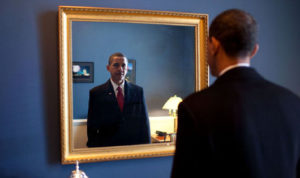Special to WorldTribune.com, November 16, 2016
Historians will debate the importance of the Obama Administration and its role in American history for decades to come, of course. The legacy which presidents leave behind them is always a concern of our chief executives, and it has been of even more importance to Barack Obama.
As he marked a milestone in his tour of duty on Nov. 14, before leaving on a foreign tour, with a successor he opposed now chosen, he publicly drew attention to his own optimistic record. He carefully picked, of course, in a press conference, what he considered the best interpretation of events over the last eight years. But at least for the time being, when his policies and their repercussions are still relatively fresh, it is hard to draw a balance sheet which is less than disastrous.

Obama, of course, perhaps more than any other recent president, is an ideologue – and he insisted in his political campaigns that he aimed at a “transformation” of American society. His framework for events is a combination of his studies of history but overlaid by the socialist and pro-Communist views of the little social-political group around the University of Chicago who launched his career.
There is no doubt that he has effected changes, whether they are indeed transformations, and whether any have been beneficiary, only time will tell.
But any honest examination of the effects of his strategies is a record of miscalculation and failures. Perhaps the most dramatic ones have been in foreign policy.
His campaign to withdraw American power and decision-making from the international scene has demonstrated what had always been apparent to serious students of foreign affairs: the enormous power of the U.S., economic, political and military, has a role in any international confrontation even when Washington chooses to remain neutral or withdraw its influence.
A world order without U.S. participation is not only unimaginable to our allies but something our adversaries always question as a possibility.
The Middle East is the most dramatic example of the failure of Obama’s effort to remove American leadership and power in the interrelated conflicts there. First, his effort to weaken the U.S.-Israel alliance encouraged the Muslim terrorists in the area. Then, Sec. of State Hillary Clinton courted the short-lived Muslim Brotherhood regime in Egypt – overthrown by the military through popular demand.
Obama and Clinton attempted to boycott the new military rulers thus providing an opportunity for Russian arms sales and influence where it had been expelled a half century ago by pro-Western Egyptians.
In Syria, Obama’s initial declaration of opposition to the Basher al Assad regime was followed by withdrawal. Washington’s retreat assured the descent into a bloody, irresolute civil war sending a flood of millions of refugees into neighboring countries and Europe.
The threat of force followed by its withdrawal has returned Moscow to a base in the eastern Mediterranean and helped extend the Teheran mullahs’ state terrorism excesses across the Fertile Crescent, even into Latin America.
A treaty to curb Teheran’s nuclear weapons, never submitted to the Senate as the Constitution demands, is rapidly disintegrating.
In East and South Asia, Obama’s ambivalent policies toward Chinese aggression have encouraged Beijing to aggressive territorial claims against its neighbors and discouraged unity among the Southeast Asians against Chinese Communist threats.
Again Hillary’s much publicized pivot to the Western Pacific has failed to materialize. Slowly, the rape of the American economy by the Chinese through export subsides and currency manipulation – begun in the Bush Administrations — has become so clear that the Trump Administration will have no option but a dangerous crackdown.
Obama’s role as the first American Afro-American president was, whether admitted in public discussion, seen as an important opportunity to continue to heal the historic American race problem. But whether in part because his own exotic background linked him neither to the rising black middle class nor the poor of the ghetto, he either took non-defensible positions on individual race incidents or neglected completely the mayhem of his own Chicago hometown.
One has to assume that the American black leadership can only see these past eight years as a failure by a president, whatever his color, to contribute to solution of the race problem which appears to most observers to be in an even worse condition than at his entry into office.
Obama’s claim for his Affordable Care solution to long-term U.S. medical care is nearing collapse with skyrocketing costs and failure of the insurance framework which was to support it. His steady stream of executive directives for additional regulation and environmental restraints has contributed toward the slowest and most erratic economic recovery since World War II.
Despite his rhetorical skills and personal popularity as the first black president, Obama’s legacy will be a negative one.
As the anti-Obama vote for Donald Trump has demonstrated, it will also cast a shadow on many of the techniques and political forms his very talented political team gave the nation.
Sol W. Sanders, (solsanders@twc.com), is a contributing editor for WorldTribune.com and Geostrategy-Direct.com.

